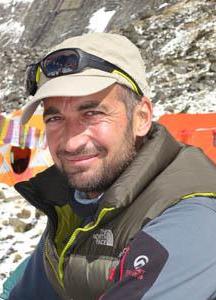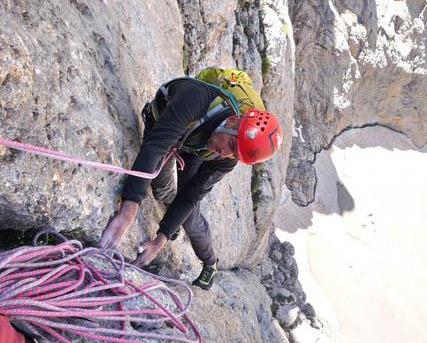A Bilkenter Who Has No Limits
BY EFE ÜSTÜNKAL (IR/IV)
 Bilkent News recently interviewed Bilkent alumnus Tunc Findik. We asked a
few questions about his experiences while at Bilkent, as well as his activities and accomplishments in the years since graduation.
Bilkent News recently interviewed Bilkent alumnus Tunc Findik. We asked a
few questions about his experiences while at Bilkent, as well as his activities and accomplishments in the years since graduation.
First of all, could you introduce yourself to our readers? Who is Tunç Fındık?
I was born in Ankara in 1972. I'm a graduate of the Bilkent Department of English Language and Literature. I live in İstanbul and am a professional mountaineer, writer and mountain guide. To this point, I have done more than 700 ascents, 300 first-ever ascents, and pioneered new routes in Turkey and abroad. I have represented our country as a mountaineer in various expeditions. In a project I have undertaken, called "14x8000," I am aiming to climb each of the world's 14 mountains over 8,000 meters in altitude. Already, I have succeeded in becoming the first Turkish mountaineer to climb 8 mountains over 8,000 meters. I am also one of only 44 climbers to have scaled the world's seven highest peaks and the first Turkish mountaineer to have reached the summit of Mount Everest twice, using different routes. I have also written seven books about mountaineering.
How were your years at Bilkent? Do you miss those times?
I spent a lot of time during my university years from 1989 to 1993 doing mountaineering and other outdoor activities.We established a student club called Bilkent Üniversitesi Doğa Sporları Topluluğu (Bilkent University Outdoor Sports Club), and I can say that we had no spare time at all; we were always occupied with climbs, treks, excursions and club meetings. As everybody knows, the experiences of your school years can vary, but to be honest, I don't miss those days that much.
So far, you have achieved multiple successes. Are there any special moments you have never forgotten?
There are lots of them. For instance, there were the 20 minutes that I spent on top of the mountain K2 -- which is 8,611 meters -- in Pakistan, in the summer of 2012. By completing an ascent that was very dangerous and full of difficulties, I had a chance to spend an incredible 20 minutes with my crew on top of the world's second highest mountain. K2 is a tough mountain -- statistically, one person out of three loses his/her life there -- and climbing it is a "once in a lifetime" accomplishment.
The words "fear" and "danger" come to many people's minds when mountaineering is mentioned. For Tunç Fındık, what do these words mean?
They're part of my life. Mountaineering entails a huge risk; in particular, difficult ascents and ascents of high mountains comprise huge risks, and climbers should consider what a true risk is and evaluate their own limits properly. Risk and danger - and with them surprise and obscurity -- are inescapable facts of mountaineering. Without them, mountaineering would be an ordinary sport like tennis, basketball or golf. Accordingly, mountaineering and climbing require people to know themselves mentally, physically and intellectually. Fear is a necessary and normal feeling. When there is no fear, a mountaineer is not able to know his/her limits, and the risks mount up. When you make decisions that directly concern your life, it's necessary to behave in an intelligent and realistic way. You have to evaluate the risks accurately, and you have to know yourself and the mountain well. Briefly, as an elite sport, mountaineering is not a sport in which you use only brute strength. It requires calculation and mental depth.
What do you do in your spare time?
"Do you have any spare time?" would actually be the right question! Besides, I don't like having free time. All of my time is taken up by my priorities, which are mountaineering and climbing, travel and meetings, finding sponsors for major climbs, researching and writing books, making presentations, and practicing to keep in good form (by wall climbing, rock climbing, etc.). Usually, for 5-6 months a year, I'm over 5,000 meters, up in the mountains. Other than that, I like spending my time in the village of Geyikbayırı in Antalya, which is in a mountainous region good for rock climbing.
Lastly, what are your suggestions for Bilkenters, whether or not they've chosen to become mountaineers?
Bilkent is an excellent university. I suggest that students use every opportunity they can to enrich their school experience with a variety of activities. Thanks to the many student clubs at Bilkent, it's very easy for a student's life to include many sporting and social activities.
